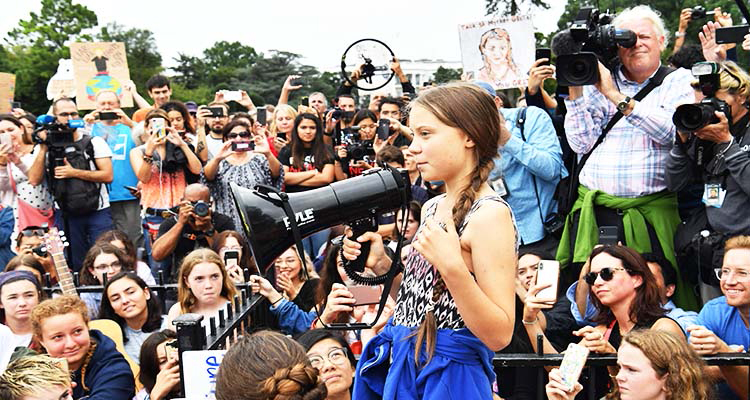Friday’s Global Climate Strike is a chance to shake the complacency of leaders and governments who refuse to take climate change seriously

All governments, knowing that fossil-fuelled economies damage the climate and threaten our future, have pledged to lower carbon emissions. But most have taken no effective action.
Called to account, they respond with evasion, concealment, and downright lies. That applies in Australia, at both federal and state levels, and it’s been the situation since the 1980s. All those years of false dawns and dashed hopes.
It happens because voters allow it to, accepting the narrative that climate change is a second-order issue. But mounting evidence and cranky weather are making people nervous.
Since 2009, the Climate of the Nation survey has been mapping public attitudes around climate. The 2019 survey reveals that around four in five Australians are now seriously bothered about droughts, floods, water shortages and species extinction. Over half of us think there should be a moratorium on new coal mines.
The Bureau of Meteorology reports that in the first eight months of 2019 – with national rainfall the fifth-lowest on record – Australia’s mean temperature was the second highest in 110 years of observations. That is on top of record or near-record warming in each of the past seven years.
Extreme warming from ever-rising emissions is now evident over much of Europe, northern Asia, the Middle East, in oceanic hot zones including off Tasmania’s east coast, and – especially – in the Arctic. Strong warming is helping to drive exceptional floods, droughts, fires and coral bleaching.
Australia’s vulnerability doesn’t seem to register with either major party. Scott Morrison could have chosen to put his weight behind strengthening climate policy when he became prime minister last year, but he didn’t. There’s ample evidence that he takes it about as seriously as tying his shoelaces.
Tony Abbott’s “axe the tax” campaign saw Labor opt for bipartisanship over effective policy. Now many in the party think Bill Shorten’s 2030 target to cut emissions by 45 per cent is too hard.
It has been said many times before that we’re at a crossroads, but we’ve been stuck there for years while governments fiddle with things they deem more important. In truth our country is doing next to nothing, either to mitigate the danger or to deal with it when it arrives.
Every country faces the same confronting future, and authorities everywhere need all the help their people can give them. If the federal government could only muster the courage to change tack, it would get plenty of public support in the huge task facing us all.
Instead we are confronted with the vitriol that passes for question time when parliament is sitting, or snappy, five-second attacks on opponents that we dignify with the title “press conference”. It seems an age since we had leaders able to rise above name-calling and point-scoring.
Instead of substantive policy development and debate we get populist posturing, scapegoating and trivialising of important issues. Chicanery around party donations and secretive dealings with the wealthy and privileged tell us our political class has abandoned public service for its own gain.
We need a mature debate about what climate change means for our nation. And we desperately need governments to prioritise communities and their well-being ahead of the individual hip pocket.
Those masters need to be persuaded that sticking with today’s mindsets and misdeeds spells electoral doom, and that can only happen if a big proportion of the electorate delivers a powerful signal of disapproval.
For an hour or two on Friday Australians are being asked to put other business aside and focus on the state of the planet. The Global Climate Strike grew out of a 2018 strike action by Australian students that drew inspiration from the solitary protest of a Swedish schoolgirl, Greta Thunberg.
Next Monday Thunberg will deliver her message to the world at the UN Climate Summit in New York. As it happens Scott Morrison will be in the US next week. He could join other leaders to hear what she and others say, but when Thunberg speaks he’ll be in Washington to dine with Donald Trump.
In reach and participation, Friday’s event will be huge. Past environmental and anti-war protests have focused on regional or national issues, but this is for everyone, everywhere. At thousands of venues in countries around the world, millions of people will be making their presence felt.
Governments may be in denial about the climate, but they can count. A big turnout on Friday will have an impact. It will bring more to the next rally and more again after that, until governments everywhere feel the heat like the rest of us. That’s democracy at work.
• TASMANIA is hosting four public rallies for the Global Climate Strike, starting at noon on Friday in Hobart’s Parliament Lawns, Launceston Town Hall, Devonport’s Providore Place and Cow Park, Wynyard. Elsewhere you can do as Greta did: take your placard to a public place and stay a while.
